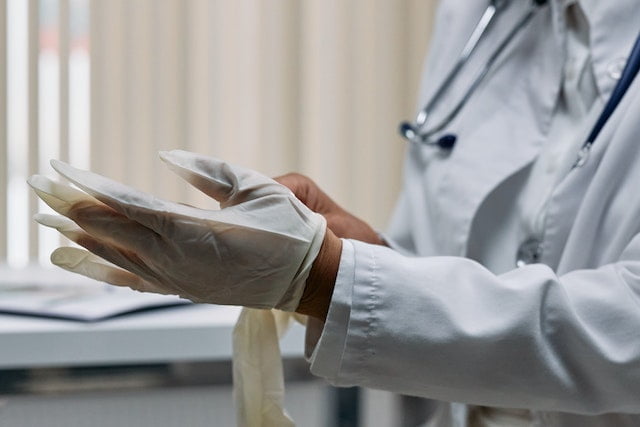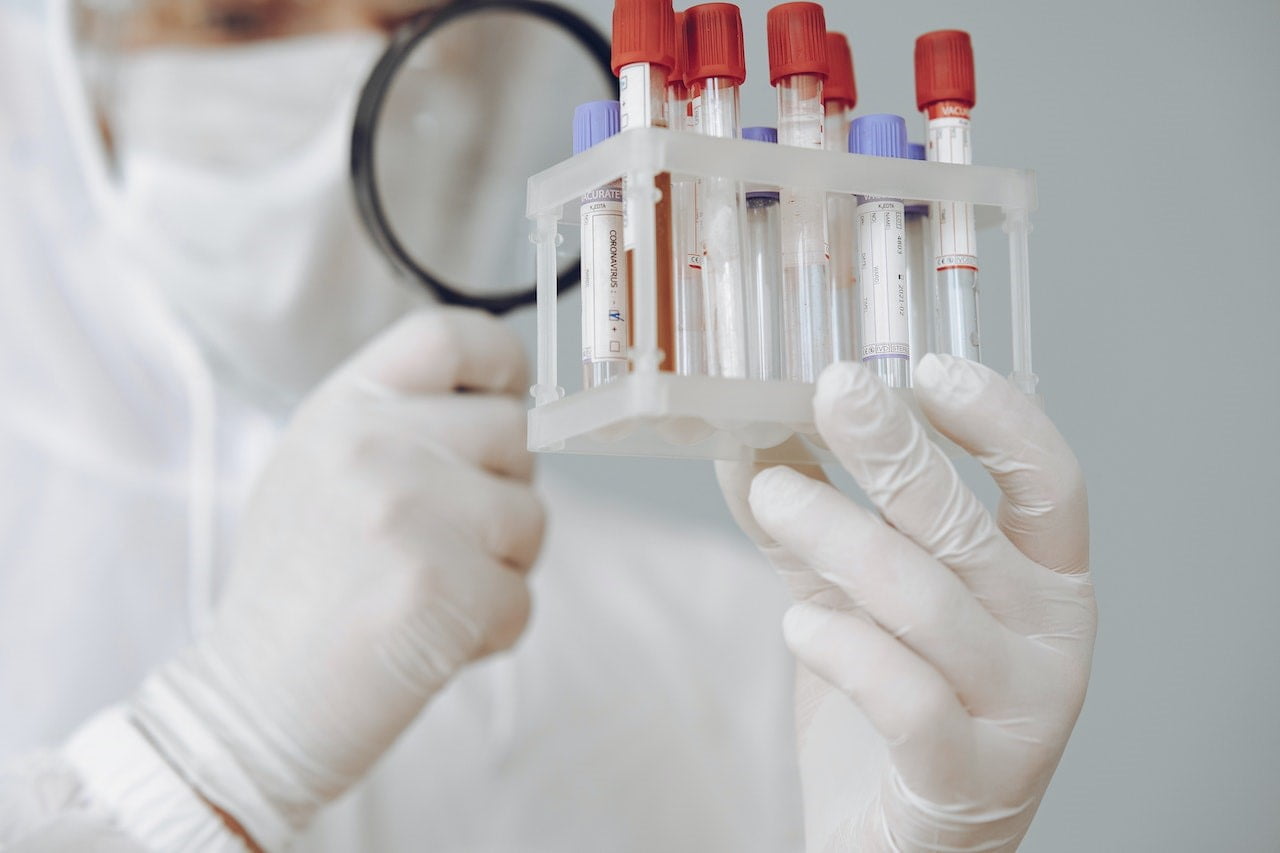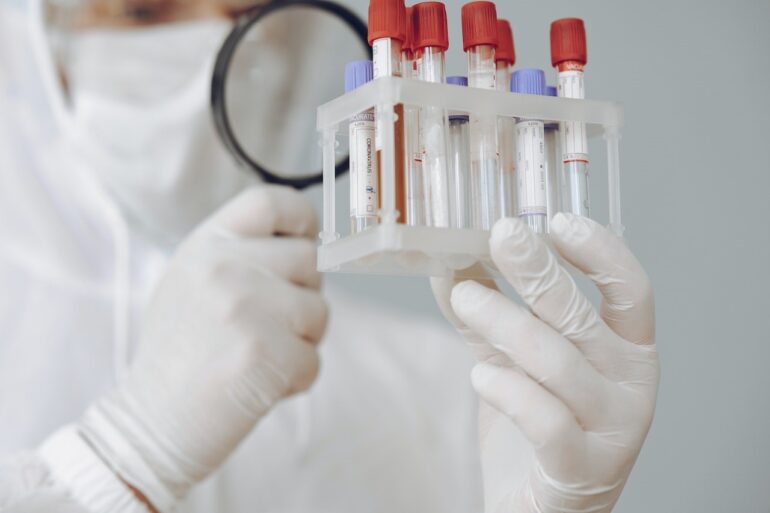Among many consumable items used in the healthcare setup every day, gloves occupy a special place as they reduce the chances of cross-contamination and make the job safer for the healthcare staff as well as the patients. When it comes to types, various kinds of gloves are available in the market which differ in their composition and uses. One such gloves are vinyl gloves. Let us take a look at what basic synthetic vinyl disposable gloves are and where are they used.

Use of gloves in the laboratory
What are basic synthetic vinyl disposable gloves?
Vinyl gloves are the second generation of gloves after the latex ones which are prepared by the monomers of synthetic polymer named polyvinyl chloride or PVC. As PVC is a rigid material, a plasticizer is added to it to enhance the flexibility of the gloves and make them easy to wear. These are widely used in different fields to serve multiple purposes. Usually, vinyl gloves come as transparent gloves but also come in ivory or blue color.

A physician wearing vinyl gloves
Characteristics features of vinyl gloves
The basic synthetic vinyl disposable gloves have the following properties:
- Disposability: Vinyl gloves, being disposable, are a single-use item.
- Allergy resistance: Being latex-free, the vinyl gloves do not pose a risk of a Type I allergic reaction which is characterized by skin irritation, swelling, runny nose, appearance of cracks, rashes, and blisters on the skin.
- Durability: Vinyl gloves have better strength than polythene ones but are less durable than latex and nitrile gloves.
- Cost-effectiveness: Based on a price comparison, vinyl gloves are cost-effective as they are cheaper than latex as well as nitrile gloves.
- Absence of chemical accelerators: Unlike nitrile gloves, vinyl gloves are free from any kind of chemical accelerators thus rendering it nearly impossible to get Type IV allergy after wearing them.
- Powder-free vinyl gloves: Vinyl gloves are available in both powdered and powder-free forms. If a person is prone to contracting allergies, powder-free vinyl gloves are the best choice for them.
- Ease of use: As the fitting of vinyl gloves is not as good as that of latex or nitrile gloves, these are often preferred for jobs where quick donning followed by rapid removal is required.
- Anti-static properties: Vinyl gloves are anti-static because of being prepared with a material that is an insulator. When someone deals with static-prone items, the vinyl gloves dissipate the static buildup thus protecting against electric current. Due to this property, they are extensively used by personnel who deal with electrical equipment repair and maintenance.
Uses and benefits of vinyl gloves
Synthetic vinyl gloves are employed in the following processes:
- Medical-grade vinyl gloves are frequently employed in the fields of healthcare, dentistry, medical examination, patient care, hygiene maintenance, beauty services, and tattooing.
- Vinyl gloves are a good choice when it comes to dealing with body fluids such as blood and urine samples.
- Vinyl gloves, with a certification of EN1186, have been famous in the food industry as they are considered safe for all kinds of edible items except for fatty foods. Owing to their low cost, they are often employed in kitchens.
- These standard vinyl gloves are often used while handling low-risk chemicals such as detergents and domestic washing liquids.
- Vinyl gloves can also be used while painting to prevent the hands from being painted as well as dyes. Apart from this, vinyl gloves can also be worn while dealing with printing ink.

Employment of vinyl gloves while dealing with biological samples
For a wide range of disposable medical-grade gloves, do check out our products page, a place where all the medical items are available under one roof with unmatched quality and affordable prices.
Difference between medical-grade and standard vinyl gloves
Vinyl gloves can be classified into two types:
- Medical-grade vinyl gloves
- Standard vinyl gloves
Both of these types differ based on the minimum acceptance quality limits or AQL. For medical-grade vinyl gloves, the AQL value must not exceed 1.5.
Comparison of vinyl gloves with other types
The following table gives a comparison of vinyl gloves with the other available gloves based on various properties:
| Parameters | Vinyl gloves | Nitrile gloves | Latex gloves | Nitrile-vinyl blend gloves |
| Material | PVC | Nitrile butadiene rubber (NBR) | Natural rubber | NBR+PVC |
| Allergy risk | Low | Low | Highest | Low |
| Abrasive resistance | Low | Highest | Low | Moderate |
| Cut resistance | Low | High | High | Moderate |
| Tearing strength | Moderate | High | Highest | Moderate |
| Puncture strength | Low | Highest | Moderate | Moderate |
| Chemical resistance | Moderate | Highest | Low | Moderate |
| Tactile sensitivity | Low | Moderate | Highest | Moderate |
| Price | Moderate | Expensive | Low | Expensive |
Conclusion
Gloves are a type of consumable item which have extensive use in healthcare facilities along with many other fields. Among many different types of gloves, vinyl gloves are also one of the items which are safe to use while dealing with edibles such as food and medications. Due to their cost-effectiveness, they are much cheaper than latex and nitrile gloves. Moreover, their property of being latex-free renders them safe to use in subjects who are prone to getting allergic reactions from wearing gloves. Overall, vinyl gloves are safe, string, and cost-effective.

PhD Scholar (Pharmaceutics), MPhil (Pharmaceutics), Pharm D, B. Sc.
Uzma Zafar is a dedicated and highly motivated pharmaceutical professional currently pursuing her PhD in Pharmaceutics at the Punjab University College of Pharmacy, University of the Punjab. With a comprehensive academic and research background, Uzma has consistently excelled in her studies, securing first division throughout her educational journey.
Uzma’s passion for the pharmaceutical field is evident from her active engagement during her Doctor of Pharmacy (Pharm.D) program, where she not only mastered industrial techniques and clinical case studies but also delved into marketing strategies and management skills.
Throughout her career, Uzma has actively contributed to the pharmaceutical sciences, with specific research on suspension formulation and Hepatitis C risk factors and side effects. Additionally, Uzma has lent her expertise to review and fact-check articles for the Health Supply 770 blog, ensuring the accuracy and reliability of the information presented.
As she continues her PhD, expected to complete in 2025, Uzma is eager to contribute further to the field by combining her deep knowledge of pharmaceutics with real-world applications to meet global professional standards and challenges.








